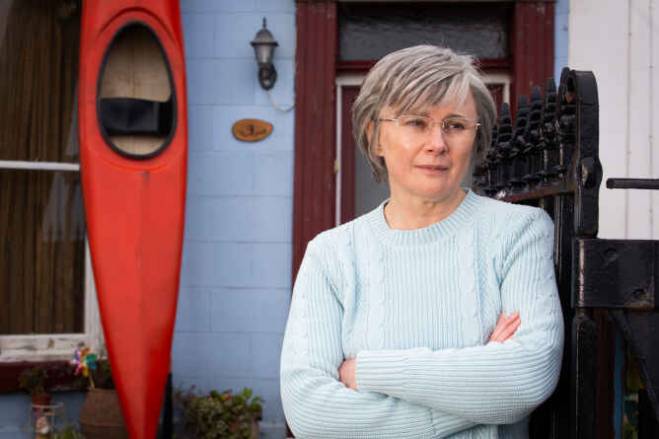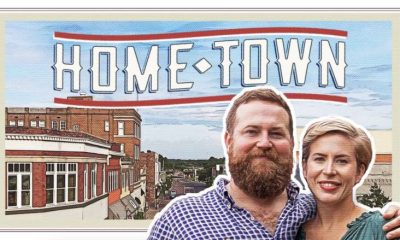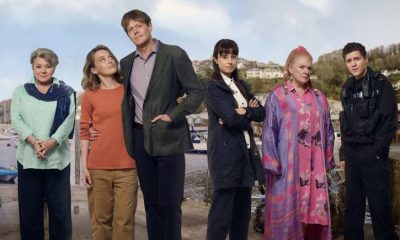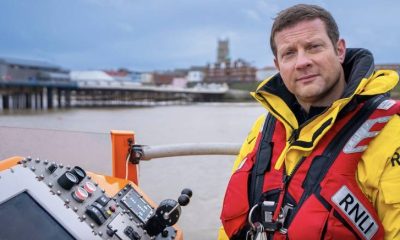Interviews
The Thief, His Wife And The Canoe | Interview with Monica Dolan (Anne Darwin)

What appealed to you about this drama?
What’s not to like about it? It’s an astonishingly interesting relationship between John and Anne. It’s also a series of events that is incredibly bizarre, and yet if you follow what they were trying to do, every individual event makes sense. The drama says something wider as well. No one is denying they were criminals, but at the same time banks were selling mortgages they shouldn’t have been selling to that couple. They were bound to get into trouble. It really is a fascinating story.
What else grabbed you about The Thief, His Wife and the Canoe?
One of the things I found very, very clever is that Anne is narrating the story, so there’s this whole issue of her mendacity. How true will her narration be? How much of what she is saying is genuine? It’s always very interesting to play a character who is untruthful. There is so much to play with – how much is she lying and how much are other people projecting things onto her?
Every scene has been illuminating about how people from all these different bodies – the police, the family liaison unit and her legal representatives – viewed her. There’s so much to be played in terms of “how good a liar is she?” If you’re lying badly, it makes other people look stupid, and they can’t all have been stupid in this story. The audience know she’s lying, and there’s no mileage in making it too obvious. Also, I don’t think John could have achieved what he did without her, and yet she inspires sympathy in people. It’s a terrific tale about an unreliable narrator.
Will that aspect of the story chime with people?
Yes. Many of us are better liars than we would like to think. We spend a lot of time acting out different roles – even within a single hour!
How much of Anne’s side of the story do you believe?
When I was playing Anne, I kept thinking, to quote Mandy Rice Davies, “she would say that, wouldn’t she?” Everything in the story is told from her point of view. One thing I learnt about economic abuse is that it is very hard to prove. So the main thing I’d say is that it’s very difficult to tell how much she was in thrall to him.
She did a lot of things independently of him, but her argument was that she could always hear him in her head coercing her. At the time, the jury were not convinced by her argument. She got very high up in the surgery where she worked. She was clearly a very, very good administrator. She wasn’t a fool. So would we be underestimating her if we said, “she must have been ignorant about that”?
Why do you think Anne behaved as she did?
You just have to look at the houses that John got massive mortgages for to see that he must have been a fantasist. Dealing with a fantasist on a day-to-day basis must take all sorts of psychological gymnastics. Also, a lot of the time he was hiding next door while Anne was dealing with other people and trying to keep his presence a secret. They used to have a clandestine signal – if the curtains were tied back, that would mean it was safe for him to come into her part of the house. Imagine living with that stress every minute of the day. But you can’t be too sympathetic – this situation was self-imposed.
What else might explain Anne’s behaviour?
It was a very difficult time for her. John treated her very badly. He had an affair as soon as they got married. But she stayed with him. One thing that struck me was when the prosecution in court asked, “what were you scared would happen if you didn’t ring the police?” She replied, “I was frightened he might leave me.” It seems there was a need in her that she couldn’t let go of. She’s trying to please people, but she ends up upsetting them.
Have you met Anne?
No. I read her book, but I was very much following the script. From the beginning, Anne didn’t want to contribute to this production. She’s done her time and I respect that. I’m okay to leave well enough alone. Also, I’ve learnt that the least useful thing an actor can bring into the room is judgement. That’s almost the opposite of what we should be doing. I also want to put it in capital letters that this is a character in a script. I’ve never met her. It’s a take on her and it’s a drama.
Did you enjoy playing a real person?
Yes. Imagination is the most important tool as an actor. That’s the fun zone. So playing someone real is quite a gift. You have so much information about them, and the audience ends up with the stories that are more interesting. Real people have so many contradictions. I don’t know if the script of Philomena would have got past the development room if it wasn’t a true story. If it hadn’t been taken from real life, the producers may have said, “Hang on, that’s too extreme and too much of a coincidence.”
How did you go about researching the drama?
Looking at the homes John owned in Hartlepool was a real eye-opener. He wanted to be a millionaire by the time he was 50, and he had just turned 50. He was buying properties in an area you would move to if you were going up in the world. The size of the houses that he was buying was amazing – they could have been hotels. His sons had just left home, and at that moment a normal person would be looking to downsize. But something extraordinary was happening in this person’s mind to want to buy houses this size at this stage in life.
What makes Chris Lang stand out as a writer?
He writes with such wit and insight. He has the thing that the Spanish Golden Age plays do so well – you’re laughing your head off one minute and are very upset the next. His script is funny and living and breathing, but a lot of it is very upsetting as well. You’re dealing with people who have trapped themselves. Chris captures those very human contradictions brilliantly.
What do you hope the takeaway from The Thief, His Wife and the Canoe will be?
I hope it provokes debate. It’s a story about forgiveness, and that is something which very much divides people. Look at The Winter’s Tale – people either love it or hate it because it’s about forgiveness. How do you know if someone is really sorry or not? There may very well be strong reactions to The Thief, His Wife and the Canoe – I really hope that there are!
How did you find it working with Eddie Marsan?
It was wonderful. It’s so exciting working with someone so intense and believable. Doing scenes with someone like that makes you up your game. They come up with things you don’t expect, and you have to raise your standards. That’s a very adventurous place to be. It’s like living dangerously – it’s the best thing to do!
-

 News2 days ago
News2 days agoClaim Your Cash? Britain’s Hidden Fortune – Tonight, 18 April 2024, ITV1
-

 News2 days ago
News2 days agoJeopardy! Recap, Winner and Today’s Final Answer Wednesday, April 17, 2024
-

 News2 days ago
News2 days agoThe Hotel Inspector: Chiltern’s View Lodges, 18 April, 2024, Channel 5
-

 News1 day ago
News1 day agoJeopardy! Recap, Winner and Today’s Final Answer Thursday April 18, 2024











































